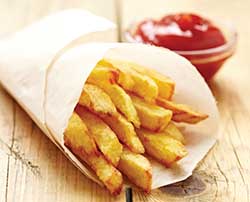FDA seeks to phase out trans fat; Nestlé cuts the salt; Adhering powders
NEWS
 FDA seeks to phase out trans fat
FDA seeks to phase out trans fat
The U.S. Food and Drug Administration is accepting comments on its proposal to eliminate the generally recognized as safe (GRAS) status of partially hydrogenated oils, the source of artificial trans fat, for use in food. Removing these oils from the food supply may prevent as many as 7,000 deaths a year from heart disease, reported the FDA.
The FDA will review the comments and if it makes a final determination that partially hydrogenated oils are not GRAS, their use in food would be phased out over several years unless food manufacturers have prior approval from the FDA to use trans fat as a food additive. More details are published in the Federal Register at https://federalregister.gov/a/2013-26854. Comments can be submitted to the FDA docket at www.regulations.gov using docket number FDA-2013-N-1317. The deadline to submit comments is Jan. 7, 2014.
Nestlé continues to cut the salt
Nestlé plans to reduce the salt content in all of its food brands worldwide to meet a World Health Organization goal of no more than 5 g of salt per person, per day, by 2025.
The company in 2005 began reformulating its foods to reduce the salt content, and it reports that by 2012, its products contained 14,043 fewer tons of salt than in 2005. It reduced salt levels in U.S. brand Stouffer’s Mac&Cheese meal by almost 15% since 2005, reached in 2012 a 20–40% reduction in salt in the Maggi So Juicy seasoning line sold in the UK, and reduced salt levels in Maggi noodles sold in Brazil by 25% and in Buitoni frozen pizza sold in France by almost 20% since 2005. Nestlé will continue to gradually reduce the salt content in its high-sodium products like ready meals, soups, noodles, recipe mixes, and pizza by at least 10% in the next three years. Its chefs are exploring ways of enhancing flavor in foods, like using spices and herbs, for example. The company also collaborates with Chromocell Corp. to discover compounds that have similar tastes for potential use as salt replacers.
Onion version may help heart health
A “tearless” onion version reportedly has an array of health benefits similar to garlic, according to a study published in Journal of Agriculture and Food Chemistry.
Researchers in New Zealand developed the tearless onion, which produces less of the protein responsible for making eyes burn and tear up and more of a sulfur compound similar to one found in garlic that is associated with cardiovascular health benefits. Their study of the health effects of the compound in the tearless onion found that the compound significantly reduced platelet clumping compared to regular onion and garlic and that consuming the tearless onion might help to control weight gain.
The study, “Inhibition of Platelet Activation by Lachrymatory Factor Synthase (LFS)-Silenced (Tearless) Onion Juice,” appeared in the Nov. 6, 2013, issue of Journal of Agricultural and Food Chemistry.
--- PAGE BREAK ---
 Citrus fiber enhances meatballs
Citrus fiber enhances meatballs
Most Americans do not consume the recommended amount of dietary fiber, and a team of researchers at the University of Missouri found that adding citrus fiber to ground beef increases the fiber content without affecting the quality and taste of the meat.
They tested three batches of meatballs with 1%, 5%, and 10% of the meat substituted with citrus powder to determine the amount that could be added without affecting the meat’s texture and cooking characteristics. Citrus fiber at 1% and 5% helped to increase the cooking yield of the meatball recipe and maintain acceptable texture and color, reported the researchers. An analysis of a meatball made with 2% citrus powder showed that it contained about 5 g of fiber. The researchers suggested that citrus powder could serve as a replacement for bread crumbs in meatball recipes or could be added to ground beef for hamburgers.
Adhering powders with hydrocolloids
Hydrocolloids can be used to replace oil and sugar to help powders and small particulates adhere to food surfaces, helping the food industry lower fat and calories in foods like crackers, according to researchers at Ohio State University. But certain hydrocolloids work better than others depending on the type of powder, they added, due to the powder’s hydrophobicity.
The researchers applied various powdered seasonings on crackers that had been coated with hydrocolloid (gellan gum, kappa-carrageenan, methylcellulose, gum karaya, gum tragacanth, gum arabic, guar gum, modified starch, and maltodextrin), water, oil, emulsion, or sucrose solutions. The results showed that solutions of similar hydrophobicity to the powder provided the most adhesion and that structural differences of the hydrocolloids like the presence or absence of branching, substitution of sugar units, and molecular weight affect water binding and thickening of the hydrocolloid spray. Gellan gum provided the greatest adhesion of salt, barbecue, ranch, and sour cream and onion seasonings, and gum arabic gave the greatest adhesion of cheese powder.
Read more about the study, “Improving Adhesion of Seasonings to Crackers with Hydrocolloids Solutions,” which was published online early in Journal of Food Science, doi: 10.1111/1750-3841.12266.
CAST accepting award nominees
The Council for Agricultural Science and Technology is accepting nominations for the 2014 Borlaug CAST Communication Award, which recognizes professionals actively working in the agricultural, environmental, or food sectors who are promoting agricultural science in the public policy arena.
The winner of the award will receive a bronze sculpture, an honorarium, and the opportunity to speak at a CAST award ceremony during the 2014 World Food Prize Symposium. The nomination deadline is Feb. 3, 2014. Visit www.cast-science.org/borlaug_cast_communication_award/nominations for more information.
What’s new with food companies
• AB Enzymes and Barentz have signed a five-year distribution agreement.
• Arla Foods Ingredients has launched a microsite—http://hydro365.info—for its Lacprodan® HYDRO 365 whey protein hydrolysate.
• Biocatalysts has opened a production plant for intracellular enzymes.
• BioControl Systems has received AOAC-PTM Certification for its Assurance GDS® Salmonella Tq mEHEC method from the AOAC Research Institute’s Performance Tested MethodsSM Program.
• Blue Marble Biomaterials, has purchased the former GTC Oats Inc. facility in Missoula, Mont., which will become the company’s large commercial biorefinery.
• Cargill has launched three new tools in its portfolio of Price Risk Services to help customers manage the volatility of cocoa prices when sourcing ingredients.
• Didion Milling earned a Food Safety System Certification (FSSC) 22000.
• FONA International has launched the Discover FONA website at www.fona.com/discover-fona for educators.
• Joint venture company P.T. Barry Callebaut Comextra Indonesia has opened a cocoa facility in Makassar, Indonesia.
• Kancor North America has expanded its presence in North America by opening offices in Morristown, N.J.
• Kemin Industries has opened its Molecular Advancement Center facility at its corporate headquarters in Des Moines, Iowa.
• LycoRed has expanded the production capacity of its naturally derived beta-carotene colorings at its facilities in Ukraine.
• Mondelez International is launching its Carte Noire and Velours Noir brands of coffee products in the Netherlands and Australia and is expanding its new Nespresso® compatible espresso capsules in Spain.
• Naturex and the University of Avignon have formed a joint research laboratory for developing eco-friendly extraction processes.
• Nielsen-Massey Vanillas has expanded its manufacturing facility in Leeuwarden, the Netherlands, to include more office and production space.
• Olam Spices & Vegetable Ingredients has opened an Innovation and Quality Center at its headquarters in Fresno, Calif.
• Omega Ingredients and The Lebermuth Co. have partnered to provide Lebermuth’s essential oils to Omega’s clients in the UK.
• Oskar Blues Brewery and Auburn Univ. have created a new graduate-level certificate in brewing science and operations.
• Palsgaard recently opened its emulsifier processing factory in Nusajaya, Johor, Malaysia.
• PureCircle Ltd. has opened PureCircle Mexico in Mexico City.
• Roquette has received GRAS designation for its microalgae-based lipid food ingredient.
• SensoryEffects has acquired the dairy and nondairy creamer business from Quality Ingredients Corp.
• TIC Gums has opened its 200,000-sq-ft Brass Mill Operations Center in Belcamp, Md. It currently contains warehouse space, but future plans include adding manufacturing capabilities. This is the third TIC Gums facility in Maryland.
 Karen Nachay,
Karen Nachay,
Senior Associate Editor
[email protected]
